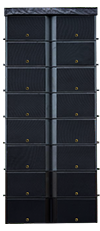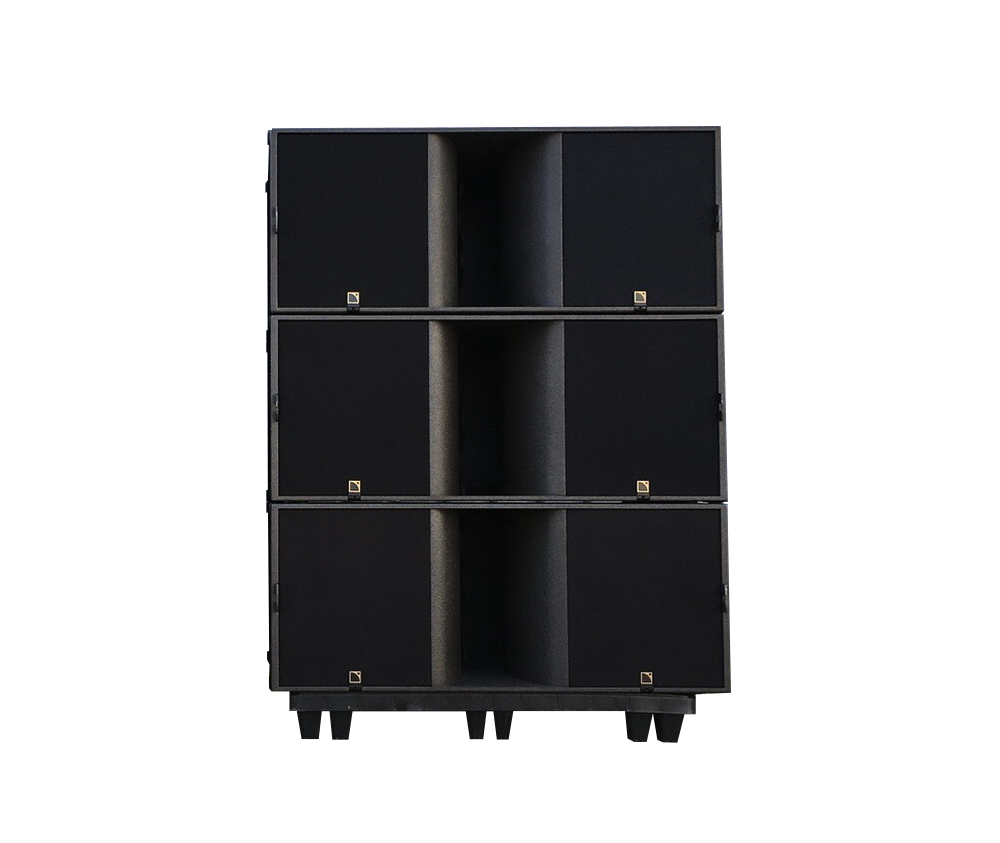Choosing the Perfect Sound System for Events: A Complete Guide
Dec 05, 2024A high-quality sound system is essential for the success of any event, whether it's a conference, concert, or festival. In this guide, let's explore with AVVietnam the importance of a sound system for events, its essential components, how to choose the right setup for your venue, and tips for renting the perfect audio equipment.

Sound plays a very important role in any event, big or small
The importance of the sound system for events
Capturing audience attention
A professional sound system ensures that the audience remains engaged from start to finish. Clear audio helps keep attendees focused, allowing them to fully absorb presentations, speeches, or performances without distractions from poor sound quality.
Enhancing emotional connection
Sound plays a significant role in creating an emotional atmosphere. Whether it's the heartfelt notes of a song or the inspiring tone of a speech, high-quality audio amplifies emotions and helps the audience connect deeply with the event’s content.
Ensuring message clarity
For events like conferences and seminars, delivering a clear message is essential. A top-notch sound system makes sure that every word is heard precisely, preventing misunderstandings and allowing the audience to gain the most from the content being presented.
Creating a professional impression
A quality sound setup shows a commitment to professionalism and event excellence. When audiences experience seamless sound, it reflects positively on the event organizers, boosting credibility and leaving a lasting positive impression.

Sound makes a strong impression on attendees
Accommodating large venues and audiences
In larger spaces or outdoor events, an effective sound system is crucial to reach everyone in the audience. High-power speakers and carefully positioned equipment ensure consistent sound coverage, ensuring no attendee misses out on the experience regardless of where they are seated.
Essential components of a sound system
A quality sound system is made up of several key components, each contributing to the overall audio experience. Whether you’re setting up the sound system for a concert, a corporate event, or a small gathering, understanding the function of each component ensures that your sound setup meets all requirements. Here’s a breakdown of the essential parts and their roles in delivering clear, impactful audio.
Music players and playback devices
Modern music players today are capable of playing the most popular formats, such as High-Resolution (LPCM, FLAC, ALAC, DSD), CD, SACD, DVD-A, and DVD-V. With so many options available, choosing the right one depends on personal preferences, usage needs, and the possibility of future upgrades.
It’s best to try listening directly to identify the player that provides the best sound quality and suits your system. If your source is a phone or computer, a DAC is needed to convert the digital signal to analog.

Image of sound system being set up by AV Vietnam staff
DAC (digital-to-analog converter)
The DAC, also known as D/A or D2A, converts digital signals to analog. This is an essential device in a music listening system because amplifiers only receive analog signals, while digital music is stored in electronic format. The DAC’s role is to convert these digital signals into analog so the amplifier can process them.
Pre-amplifier
There are two main types of pre-amplifiers: active and passive. Active pre-amplifiers use components like tubes, transistors, and ICs to amplify the signal and adjust the tone before sending it to the power amplifier. Passive pre-amplifiers, on the other hand, only use high-end potentiometers or wide-range audio-frequency transformers. They don’t require a power supply and are typically suited to semiconductor amplifiers. Passive pre-amplifiers have the advantage of a simpler circuit with less noise.
Power amplifiers and integrated amplifiers
Power amplifiers are responsible for amplifying signals from a low level to one powerful enough to drive speakers. An integrated amplifier combines both a pre-amplifier and a power amplifier in a single chassis, while a receiver includes these as well as a tuner for receiving radio signals.
Speakers
Speakers are an essential component in Hi-Fi and Hi-End systems, converting electrical signals into mechanical motion to reproduce sound. Quality speakers represent a combination of advanced electronic and mechanical engineering along with the refined craftsmanship of skilled artisans.

High-end speaker system of AV Vietnam
Wires
Signal and speaker wires are crucial elements in high-fidelity, high-end, and home theater systems, ensuring seamless sound transmission between devices. Choosing the appropriate wire type can improve sound quality and help maximize the performance of the entire audio system.
Isolation transformers and power filters
To enhance power quality, isolation transformers, power filters, and high-quality power cords can be used. These devices help filter noise, stabilize voltage, and provide clean, stable power, significantly improving sound quality, especially in music and karaoke setups.
Audio Shelves
Audio shelves come in standard sizes to fit most devices, making the space more organized and professional. Some shelves also feature anti-vibration systems with adjustable spikes, which enhance device stability and minimize interference for an optimal listening experience.
How to choose the right sound system for the event and venue
When it comes to selecting a sound system, it's essential to consider both the unique needs of the event and the specific characteristics of the venue. Whether it's a conference, concert, or gala, choosing the best sound system for big events is crucial to delivering an exceptional experience. Here’s a guide on the key aspects to evaluate for making the best choice.

Sound and light images in events organized by AV Vietnam
Assess event requirements
Every event has distinct audio needs, whether it’s a conference meeting, concert, or wedding. Assessing the event size, the expected number of attendees, and the type of presentations or performances can help determine the power and setup needed.
A small, intimate gathering may require minimal amplification, while a large outdoor event will need high-powered speakers and possibly additional equipment. Factoring in these details ensures a sound system that meets and enhances the event atmosphere.
Choose the appropriate sound type
Different events benefit from different sound types, including mono, stereo, and surround sound setups. Mono sound may suffice for speeches, while stereo or surround sound can create a more immersive experience for music performances.
Evaluating the nature of the event, speaker positions, and venue acoustics will help decide which sound type to use. Considering whether the event is indoors or outdoors is also crucial, as outdoor spaces often need more robust sound projection.
Set a budget
Determining a clear budget helps prioritize essential sound components without overspending. While a high-end sound system for events can deliver impressive quality, there are often cost-effective options that still achieve excellent results.
Budgeting also involves balancing between necessary equipment, such as hiring microphones, renting speakers, leasing mixers, and optional additions like subwoofers or acoustic panels. A well-planned budget can ensure the event has quality audio without straining resources.
Test and set up the sound system for events
Testing and setting up the sound system before the event is key to ensuring smooth operation on the day. Testing allows you to fine-tune settings, adjust volume levels, and identify any potential issues with sound clarity or feedback.
Once the sound is clear and balanced, a proper setup, considering both the venue layout and speaker placements, ensures even sound distribution. Running a final check before the event begins will help ensure a successful and interruption-free audio experience.
Renting audio equipment for different events
Meetings and conferences
For smaller meetings and conferences held in ballroom-style setups, a straightforward sound system that suits the room size is generally sufficient. However, as conferences grow into multi-room events or large-scale productions, it becomes necessary to enhance the sound system for events by adding more microphones, speakers, amplifiers, audio mixers, and other essential equipment.
This ensures that everyone in the audience enjoys clear and balanced audio. Additionally, considering the venue's acoustics is crucial when configuring the sound system to achieve the best sound quality.

Audio and video images from the conference organized by AV Vietnam
Concerts in theaters and arenas
For musical performances or events that require high-volume sound, it's essential to adjust your sound system for events based on the venue size and the complexity of the performance. In small to mid-sized venues, high-quality stereo loudspeakers, paired with a subwoofer and the right number of high-wattage amplifiers, are typically required.
A mixer with enough channels to accommodate all your inputs, typically in the range of 12-24 channels, is also necessary. Additionally, using equipment like graphic equalizers (EQs) can assist technicians in fine-tuning the sound by eliminating unwanted frequencies.
Large music festivals and outdoor events
When you're aiming to fill larger indoor theaters or arenas, you'll need a sound system that offers complete sonic control. With a venue capacity of at least 1000 people, both power and sound quality become essential.
This requires a comprehensive sound system setup for outdoor events, including loudspeakers, subwoofers, amplifiers, and a sufficient power supply to guarantee uninterrupted performance. Additionally, your audio mixer must have enough channels to handle all your inputs, and a high-quality equalizer is crucial for effectively managing the audio tone.
For sound systems for outdoor events, ensuring weather-resistant equipment and proper acoustic design is key to delivering clear sound in open-air environments.

Outdoor event images organized by AV Vietnam
Music festivals, stadiums, and open-air events
Sound system rental for events, stadium performances, and outdoor events can be quite challenging due to the scale of these occasions. With expansive stage setups and large audiences, sound must be projected over long distances. Therefore, your sound system for events must be powerful, durable, and capable of functioning in tough weather conditions.
Additionally, you'll need to consider the logistical demands of the event, such as cabling and power supply. For such large-scale events, it's recommended to partner with a professional sound rental provider experienced in managing similar venues.
Conclusion
In conclusion, the sound system for events with AV Vietnam ensures a seamless and professional experience, elevating the atmosphere and engaging your audience. Whether it's a conference, seminar, or grand event, AV Vietnam’s sound systems are designed to deliver crystal-clear audio. Don’t hesitate to reach out today via our hotline: (+84) 0939 311 911 or (+84) 918 640 988 for expert support and high-quality equipment.






